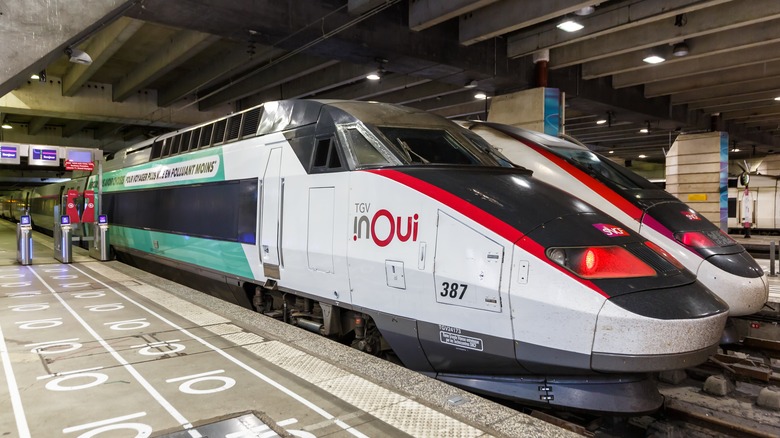How Far In Advance Should You Buy Your Train Ticket When Traveling In Europe?
In Europe, the most comfortable and sustainable way to travel is by train. Renting a car often becomes a nightmare, especially for those visiting the cities.
Meanwhile, those who travel by train glide from one glorious city center to another, passing through picturesque countryside that they have plenty of time to enjoy and photograph. Many European countries are investing in their train networks. In France and Austria, governments are forcing airlines to eliminate short-haul flights where the journey can easily be covered by train. This is good news for visitors, as the options for traveling by train in Europe are almost endless.
However, train tickets in Europe can be expensive. But they can also be an incredibly good value, and it all depends on when you buy your ticket. There is no one-size-fits-all solution for when to book your train tickets in Europe, as the networks vary from country to country. And even within countries, the best time to buy your ticket often depends on the type of train you want to take.
The United Kingdom
The rail network in the U.K. is extensive, and journeys by train are often faster than by car. London to Manchester, for example, takes almost four hours by car but just over two hours by rail. However, you'll want to book in advance if you plan on traveling this route or any medium- or long-distance route.
Advance tickets, which are up to 61% cheaper than those bought on the day of travel, are usually released 12 weeks ahead of the date of departure in the U.K. Trainline — a website you can use to purchase tickets for most routes in Europe for a small booking fee — allows you to sign up for ticket alerts and will email you when tickets for your route and dates are released. Then you can jump on and take advantage of the lowest fares.
Suppose you don't want to or can't plan that far ahead. There are other ways to save on train tickets in the U.K. Look for off-peak tickets that allow you to travel during less busy times and plan to travel on weekdays rather than weekends.
France
France's TGV network of high-speed trains is world-famous and deservedly so. You can be whisked from beautiful Paris to Marseille on the glittering French Riviera in just over three hours (for comparison, the same journey by car takes almost eight hours.) But of course, you're already convinced that you should be traveling by train — you just want to know when to buy a ticket.
Much like in the U.K., it's best to book ahead if you can, particularly for the high-speed trains. Tickets are released four months ahead of the departure date, so hop online and secure a seat as quickly as possible. You can book tickets on the SNCF Connect website, which is in English and is easy to navigate.
For comparison, tickets from Paris to Nice can cost 125 euros when bought the same day but just 25 euros when booked in advance, saving you 100 euros to spend on delectable French food and wine. While there are almost always places on the trains, if you're traveling over a holiday weekend, it's best to book ahead, as you may be left high and dry.
The rest of Europe
We think you get the idea. For fast trains and long-distance rail trips, you should book in advance. And here are some more popular countries for train travel and when you should book. In Italy, Trenitalia usually releases tickets four months ahead of the travel date, though this does vary, so if you don't see the train you want, look again a little later. Prices are not as wildly different as in France or the U.K., but a same-day ticket from Rome to Florence can cost 55 euros, while bought in advance, it can be as little as 15 euros.
In Germany, super saver tickets can be bought up to 180 days before the travel date, so you can plan well in advance. In Spain, too, it pays to book before you travel, but the train operators are slightly more erratic about when they release their tickets. Tickets for high-speed trains should be released 90 days ahead of travel, but keep checking if you don't see what you want.
As you move further east in Europe, train travel becomes cheaper, and the price differences for booking in advance versus buying same-day tickets begin to shrink. In Poland, tickets for domestic journeys can be booked 30 days in advance, but the prices often only change by around $10 from day-of-travel booking to advance booking. The situation is similar in Czechia, with bookings opening 60 days in advance, but cheap tickets available up to one week before departure.
International trains
It's easy to travel internationally on trains in Europe, particularly in the Schengen area, where there are no passport checks at the borders (though you should always carry your travel documents and any visas you hold). The same rules tend to apply to international and domestic bookings, so begin checking tickets around three months before your travel date to get the best prices.
OBB, an Austrian train company, runs many international trains, and bookings open up 180 days in advance, which is when you can snag the cheapest tickets. The company also runs a lot of night trains across Europe, and booking in advance can bring extra savings. For those looking to travel from the U.K. to France by train, Eurostar bookings open 120 days ahead of travel, and savings can be substantial when you plan ahead.
If you prefer to keep your travel plans flexible and are traveling to multiple destinations, consider getting a Eurail pass. The pass covers train travel in 33 European countries. And while your tickets will likely end up being cheaper if you book everything in advance, using a Eurail pass will be cheaper for those who want to play their trip by ear.




